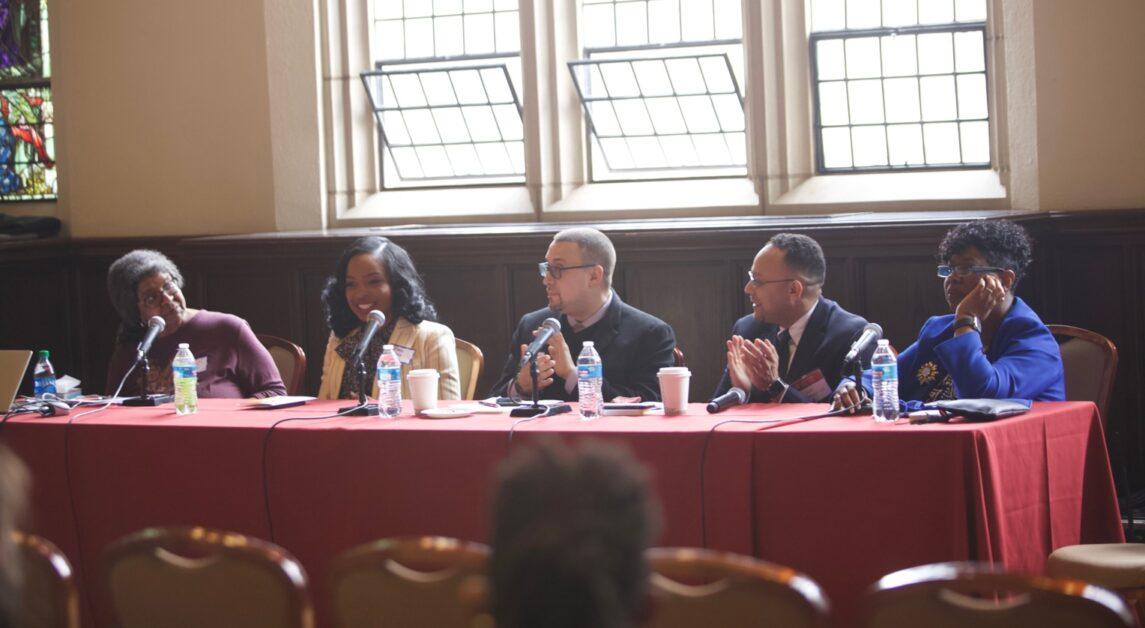Fifty years later, the now-African and African Diaspora Studies Program (AADS) continues to pursue its goal of broadening the range of intellectual and critical perspectives on campus, according to Martin Summers, an AADS professor.
“Although we rarely refer to the Black Studies movement as a current phenomenon, if we were to think about it as a living entity, one could say that it is moving into middle age,” Summers said. “The products of the movement, Black Studies and African American Studies, are in the midst of celebrating their 50th anniversaries.”
AADS, the oldest interdisciplinary program at BC, commemorated its past five decades on Saturday with keynote speaker Régine Jean-Charles, varying guest panelists, a walking tour, and a musical celebration at BC’s Blacks In Boston Conference in Gasson 100. Cynthia Young, then-Black Studies program director and associate professor of English, renamed the program to AADS in January of 2006.
In 1983, former Black Studies Director Amanda Houston pioneered the Blacks In Boston conference series. This year’s conference marked the 10th time that BC alumni, students, faculty, staff, and administrators gathered to discuss and celebrate Black experiences and communities in Boston.
“Black Studies has always been a political project as much as an intellectual one,” Summers said. “Black Studies at Boston College emerged alongside the Black Talent program, a student-led effort to recruit more Black students to the University, reflecting this idea that Black Studies is as much about institutional change as it is an intellectual pursuit.”
Summers said this year’s conference was devoted to exploring the future of AADS and remembering its accomplishments of the past.
“Like many people who enter middle age, we might take this moment to reflect on our life choices and to think about where we go from here,” Summers said.
The conferences in previous years addressed an array of subjects, ranging from the struggle for equal education to the relationship between Irish and Black Boston communities. This year’s event focused on situating Black Studies in today’s political and social climate.
“Our first panel, which will reflect on Black Studies in Boston and beyond, focuses on the history and the current status of Black Studies at Boston-area universities, and it also gets a chance to discuss the state of Black Studies in our precarious times,” Summers said ahead of the conference. “[Today] is characterized by new culture wars and, especially, the attacks on the 1619 Project and Critical Race Theory.”
In the first panel, Young, now a professor at Penn State University, described how the program operated when she first arrived at AADS in 2005.
“[AADS] was really a program that was very community-facing but had not been also university-facing,” Young said. “When I got there, most of the classes were taught after 4 p.m. and taught by adjunct professors. There hadn’t been very much curriculum development, and there wasn’t much interaction between the program as the rest of the University.”
Young also detailed how she wanted to increase the accessibility of AADS courses by ensuring that they were available to all students during the day.
“My ambition was really just to make the program as rigorous as I could to increase involvement and recruit and engage professors across the college,” Young said.
Toward the end of the conversation, panelists discussed how the COVID-19 pandemic intersected with considerations of racial inequality.
“We also have to put the scientists on the hot seat and talk to them about why they weren’t predicting that the pandemic that we are in now would disproportionately impact Indigenous, Black, and Latino communities,” Young said. “They got away with not engaging in the language of structural inequity.”
The event brought these questions back to a focus on BC with the exhibition of the “Black at BC Virtual Walking Tour and Timeline.” The walking tour—organized by Rhonda Frederick, associate professor of English and AADS, and O’Neill Library staff members—chronicles the history of the Black experience in the United States and how it unfolded on BC’s campus.
Frederick said she hopes the project will act as an accessible resource for the BC members, while also reminding people how the AADS program has impacted the University as a whole.
“The project creators and I hope that the Black at BC Walking Tour and Timeline will serve as historical and conceptual anchors for faculty, staff, students, and alums interested in learning about conducting research that we see in the nation and in larger global contexts,” Frederick said.
Following the walking tour, Voices of Imani, BC’s gospel choir group, performed vocal renditions of spiritual songs, including “Let My People Go.”
The second panel featured Black Studies alumni who voiced their appreciation for the program and urged for the creation of an entire AADS department at BC.
“It’s very important, institutionally speaking,” Juan Concepcion, a panelist and BC ’96, said. “This should be called a department. I can’t believe it has not happened yet.”
In her presentation titled “Revolutionary Dreams: Black Feminism. Black Studies. Feminist Black Studies,” Jean-Charles explored the interconnectivity of feminism and Black studies.
Jean-Charles, who is also a former BC professor, said we must look to the future of AADS, but this time through a feminist lens.
“The future of Black studies must be feminist,” she said.
While African American studies is a growing field among educational institutions, Concepcion said, he urges BC to expand its support of students in this field.
“Frederick Douglass said ‘Power concedes nothing without the band, it never has and never will,”’ he said. “And so we have to make it happen institutionally to support the amazing students who come to BC.”
Featured Image by Aditya Rao / Heights Staff













